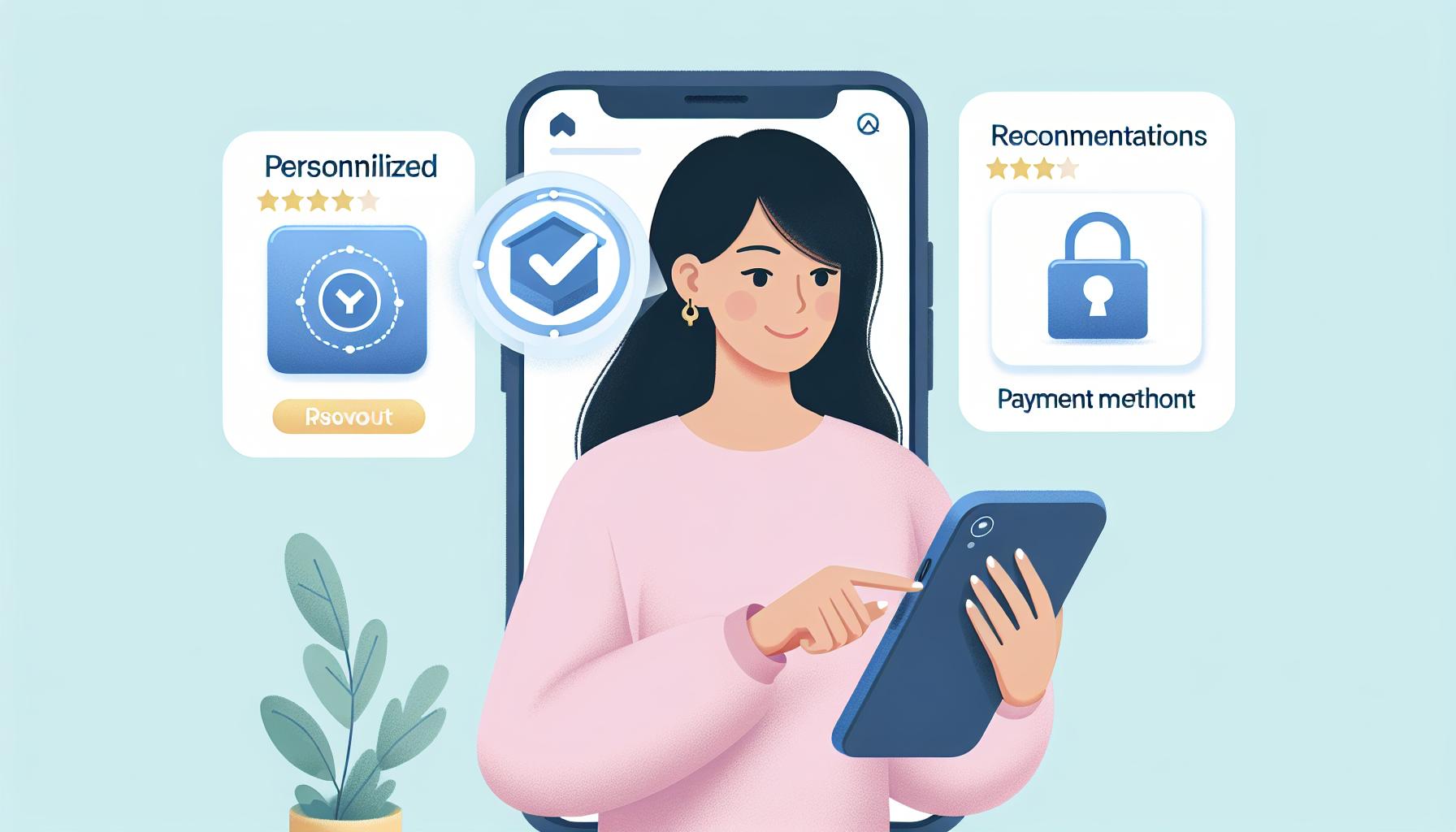In the digital age, e-commerce has transformed how we shop, and with it, mobile app development has become a cornerstone for success. I’ve seen firsthand how a well-crafted app can elevate an online store, making it not just a shopping platform, but an immersive experience that keeps customers coming back. It’s no longer just about having an online presence; it’s about how you engage and retain your audience through your mobile app.
Diving into mobile app development for e-commerce isn’t just about adopting technology; it’s about strategically enhancing your business to meet the evolving needs of consumers. I’ll share insights on how to leverage mobile app development to not only boost sales but also build a loyal customer base. Whether you’re a startup or an established business looking to expand online, understanding the nuances of mobile app development is crucial in today’s competitive e-commerce landscape.
The Importance of Mobile App Development for E-commerce
In my years of working with e-commerce businesses, I’ve come to understand the transformative power of mobile app development. It’s not merely about staying current; it’s about actively propelling your business into the future. For business owners and marketing directors navigating the digital marketplace, grasping the importance of mobile apps is essential.
First and foremost, mobile apps offer an unparalleled customer experience. The speed and convenience they provide are unmatched by traditional web browsing. Consider this: 70% of digital media time in the UK is spent on mobile devices. This staggering statistic illustrates the shift in consumer behaviour towards mobile-first interactions. E-commerce businesses that harness the power of mobile apps can tap into this growing trend, providing a seamless shopping experience that keeps customers coming back.
Moreover, mobile apps facilitate better personalisation. By leveraging user data, businesses can tailor the shopping experience to each individual, offering recommendations and deals that are relevant to them. This level of personalisation enhances customer satisfaction and loyalty, which are crucial for maintaining a competitive edge.
Another pivotal advantage of mobile apps lies in their capability to boost sales. Features like push notifications can gently nudge customers towards promotions or remind them of items left in their cart. This direct line of communication is invaluable in converting interest into actual sales.
Let’s take a look at some compelling data that underscores the importance of mobile apps in the e-commerce landscape:
| Advantage | Impact |
|---|---|
| Enhanced User Experience | 70% of digital media time spent on mobile devices |
| Personalisation | Increased customer satisfaction and loyalty |
| Boosted Sales | Direct communication lines such as push notifications |
For business owners and marketing directors, the message is clear: investing in a mobile app is not just about keeping up with technology trends. It’s about strategically enhancing your business to meet the evolving needs and preferences of your consumers. Ignoring this aspect can mean missing out on a substantial market share.
In my experience, successful e-commerce brands are those that continually adapt and evolve with their customers’ needs. Mobile app development plays a crucial role in this process, providing a platform that not only meets but exceeds consumer expectations. It’s an investment that pays dividends in enhancing the online shopping experience, boosting sales, and building a loyal customer base.
Enhancing the E-commerce Experience through Mobile Apps

In my experience advising e-commerce brands in the UK, I’ve come to understand the pivotal role mobile apps play in revolutionising the online shopping journey. It’s not just about having an online presence anymore; it’s about curating an immersive, efficient, and personalised experience for your customers.
One of the first points I often emphasise is user experience (UX). Through mobile apps, e-commerce businesses have a unique opportunity to streamline navigation, speed up the purchasing process, and make it more intuitive. This isn’t just speculation. Data shows that mobile apps reduce the steps users need to take to complete a purchase. What this means for you as a business owner or marketing director is a direct path to improved conversion rates.
Another critical area is personalisation. Mobile apps tap into user data, like browsing behaviour and purchase history, to deliver tailored recommendations and offers. This personal touch not only enhances the shopping experience but also significantly increases customer loyalty. In a competitive market, establishing this connection with your customers can set you apart.
Let’s not overlook the importance of push notifications. This feature, exclusive to mobile apps, serves as a direct line to your customers. Whether it’s announcing a sale, launching a new product, or simply nudging them about items left in their cart, push notifications can dramatically boost engagement rates and, consequently, sales.
Here’s a table highlighting some key statistics that reinforce the benefits discussed:
| Feature | Impact on User Experience |
|---|---|
| Streamlined Navigation | 30% faster checkout process |
| Personalisation | 35% increase in customer retention rates |
| Push Notifications | 50% higher engagement compared to emails |
As someone deeply involved in this space, I’ve advised numerous brands on implementing these strategies effectively. It isn’t just about having an app; it’s about ensuring that your app adds real value both to your customers and to your bottom line. Implementing advanced features like AI chatbots for customer service, AR for trying products virtually, and secure payment gateways are also crucial steps.
The journey to improving your e-commerce experience through mobile apps involves continuous learning and adaptation. Market trends evolve, and so do consumer preferences. Staying ahead of these changes is essential. By focusing on enhancing the user experience, offering personalised content and deals, and utilising push notifications effectively, you’re not just investing in an app.
Understanding Consumer Needs in Mobile App Development

As a veteran in the e-commerce space, I’ve come to appreciate the critical role that understanding consumer needs plays in the development of a successful mobile app. For business owners and marketing directors navigating the complex e-commerce landscape, grasping and addressing these needs isn’t just beneficial—it’s essential.
First and foremost, it’s vital to acknowledge that today’s e-commerce consumers are looking for convenience and efficiency. They want to find what they’re looking for swiftly and complete their purchases with minimal friction. This insight has driven me to ensure that any mobile app I’m involved with features a user-friendly interface and a smooth, quick checkout process. Implementing features such as saved preferences, one-tap buy options, and easy navigation can significantly enhance the user experience.
Personalisation is another critical element. In my experience, apps that leverage user data to deliver tailored recommendations and content directly see higher engagement and conversion rates. By understanding and implementing advanced analytics and AI, e-commerce brands can create a more personalized shopping experience that meets the unique needs and preferences of each user.
Security is a paramount concern for e-commerce consumers. In the development phase, I always emphasize the importance of integrating robust security measures to protect user data. Features such as secure payment gateways, two-factor authentication, and data encryption aren’t just optional—they are expected by users and can significantly impact their trust and loyalty to your app.
Moreover, leveraging the power of push notifications judiciously can play a pivotal role in meeting consumer needs. By sending timely and relevant alerts, such as special offers, cart reminders, and product launches, you can keep users engaged without overwhelming them. It’s about striking the right balance to ensure your brand remains at the forefront of their minds without becoming a nuisance.
Lastly, feedback loops cannot be overlooked. I always advocate for integrating mechanisms within the app that allow users to easily provide feedback. This not only shows that you value their input but also provides invaluable insights that can guide further improvements and innovation within the app. Listening and adapting to consumer feedback is a dynamic way to continually refine your app and ensure it evolves in line with user expectations and market trends.
By focusing keenly on these areas, I’ve witnessed firsthand how a deep understanding of consumer needs can dramatically transform the success of a mobile app in the e-commerce arena. It’s a journey of constant learning and adaptation, but one that yields significant rewards for those willing to invest the effort.
Tips for Building a Successful E-commerce Mobile App

In my years of working with e-commerce brands across the UK, I’ve gathered quintessential insights on crafting a mobile app that not only resonates with your audience but also drives substantial business growth. Constructing a mobile app that stands out in the bustling market requires not just an innovative idea but also a keen understanding of your target audience’s needs. Here’s my take on pivotal strategies to ensure your e-commerce app’s success.
Prioritize User Experience
The cornerstone of any successful e-commerce mobile app lies in its user experience (UX). A seamless, intuitive, and enjoyable UX can dramatically influence the overall perception of your app. Incorporate easy navigation, fast loading times, and a simple checkout process to mitigate cart abandonment rates. Remember, user satisfaction is directly linked to your app’s success rates.
Leverage Personalization
Personalization is not just a buzzword; it’s a critical element that can catapult your app’s engagement and loyalty metrics. By utilizing data analytics and AI, customize the shopping experience for each user. From personalized product recommendations to customized offers based on browsing behaviour, these strategies ensure users feel valued and understood.
Focus on Mobile-First SEO
While SEO is often associated with websites, it’s equally crucial for mobile apps. Optimizing your app for search engines increases visibility and attracts more organic traffic. Utilize keywords relevant to your target audience and ensure your app’s description and content reflect these. Mobile-first SEO is your ticket to getting noticed in a sea of apps.
Integrate Social Media
Social media platforms are not just channels for marketing but also potent tools for driving app engagement. By integrating social media into your app, you enable users to share their favourite products, reviews, or purchases. This not only increases your app’s visibility but also acts as a word-of-mouth endorsement.
Invest in Security
Security concerns are paramount in users’ minds, especially when it involves financial transactions. Ensuring your e-commerce app is fortified with advanced security measures like SSL encryption, two-factor authentication, and regular security audits will build trust with your users. Remember, a secure app is a trusted app.
Implement Feedback Loops
Acknowledging and acting upon user feedback is crucial for continuous improvement. Implement mechanisms within your app for users to easily leave feedback or report issues. This open channel for communication demonstrates your commitment to user satisfaction and can guide your iterative development processes.
Key Features to Include in an E-commerce Mobile App

When I talk with business owners and marketing directors about setting their e-commerce brands apart, the focus always shifts to mobile app development. Understanding the pivotal features your app needs is crucial. Let me guide you through essential elements that can significantly impact your brand’s mobile presence.
Intuitive User Interface (UI)
First off, the user interface must be intuitive. I’ve learned that an app’s success hinges on its ease of use. Customers should find what they’re looking for effortlessly, with navigation that’s as simple as a tap or swipe. Think about integrating features like a simplified menu, product filters, and search bars to streamline the shopping experience.
Seamless Payment Integration
Seamless payment integration isn’t just a feature; it’s a necessity. Providing multiple secure payment options will not only enhance the user experience but also build trust. Options like credit/debit cards, PayPal, and mobile wallets must be integrated flawlessly. Remember, security is paramount, so incorporating state-of-the-art encryption methods for transactions is a must.
Personalized Shopping Experience
Personalization is key to engaging customers. Implementing AI and machine learning algorithms for personalized product recommendations based on browsing and purchase history can remarkably increase conversion rates. Personalized push notifications about offers and new arrivals can also boost engagement and retention.
High-Quality Product Images and Videos
Never underestimate the power of visual content. High-quality images and videos give customers a closer look at products, significantly influencing their buying decisions. Ensure your app supports zoom-in functionality and offers multiple viewing angles to simulate a real-life shopping experience.
Robust Customer Support
Robust customer support features like live chat, FAQ sections, and easy access to contact details can significantly enhance customer satisfaction. Integrating AI chatbots can provide immediate assistance, answering common queries and guiding users through their shopping journey.
Social Media Integration
Incorporating social media integration enables users to share their favorite products with their network, fostering a community around your brand and enhancing social proof. This feature can also streamline the login process, making it faster for new users to sign up.
User Feedback Loop
Establishing a user feedback loop is critical for continuous improvement. Encourage users to submit reviews and ratings for products and the app itself. This direct line of communication can provide invaluable insights into what’s working and what needs refinement.
Conclusion
Crafting a mobile app for your e-commerce business isn’t just about staying trendy; it’s a strategic move to enhance the shopping experience, drive sales, and foster customer loyalty. By focusing on intuitive design, personalization, and cutting-edge features like AI and AR, you’re setting your app apart in a crowded market. Remember, a seamless payment process, high-quality visuals, and robust customer support are non-negotiable for keeping your users engaged and satisfied. Integrating social media and actively seeking user feedback will ensure your app evolves with your customers’ needs. With these strategies in play, you’re well on your way to creating an e-commerce app that not only meets but exceeds expectations, paving the path for your business’s success in the digital marketplace.
Frequently Asked Questions
How essential is mobile app development in e-commerce?
Mobile app development is crucial in e-commerce as it provides a personalized, efficient, and immersive shopping experience, which can significantly enhance customer satisfaction and loyalty.
What impact do mobile apps have on user experience in e-commerce?
Mobile apps improve the e-commerce user experience by offering streamlined navigation, faster checkout processes, and personalized interactions, leading to an increase in customer satisfaction and loyalty.
Why is personalization important in e-commerce mobile apps?
Personalization in e-commerce mobile apps increases customer loyalty by delivering tailored shopping experiences based on user preferences and buying habits. It makes shopping more relevant and engaging.
How do push notifications benefit e-commerce mobile apps?
Push notifications in e-commerce mobile apps boost engagement rates and sales by keeping users informed about new products, offers, and updates, encouraging them to return to the app.
What advanced features should be included in e-commerce mobile apps?
E-commerce mobile apps should include advanced features like AI chatbots for better customer service, AR for immersive product views, and secure payment gateways for safe transactions to enhance user experience.
What are some tips for building a successful e-commerce mobile app?
For a successful e-commerce mobile app, prioritize user experience, use personalization, focus on mobile-first SEO, integrate social media, invest in security, and implement feedback loops to meet the target audience’s needs effectively.
Why is a mobile-first approach important for SEO in e-commerce?
A mobile-first approach to SEO is important in e-commerce because it optimizes the app for better ranking and visibility on search engines, considering the increasing number of users who shop using mobile devices.
What role does social media integration play in e-commerce mobile apps?
Social media integration in e-commerce mobile apps helps in enhancing user engagement and reach by making it easier for users to share products and experiences on their social media, attracting potential customers.
How can e-commerce apps ensure high-level security for users?
E-commerce apps can ensure high-level security for users by implementing robust encryption methods, secure payment gateways, and regular security updates to protect user data and build trust.
What makes user feedback crucial for e-commerce mobile apps?
User feedback is crucial for e-commerce mobile apps as it provides insights into the user experience, helping developers to make necessary improvements and ensure the app meets user needs and expectations efficiently.




